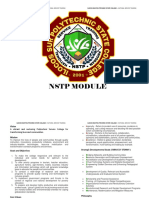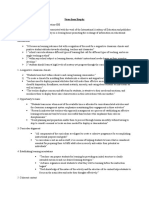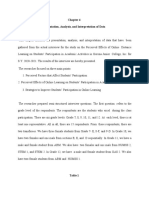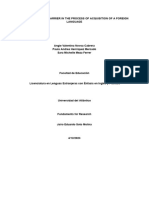0 ratings0% found this document useful (0 votes)
117 viewsThe Foundation/s of The Course R. A. 9163 - The National Service Training Program Act of 2001 The Course Syllabus of SBC CWS
The Foundation/s of The Course R. A. 9163 - The National Service Training Program Act of 2001 The Course Syllabus of SBC CWS
Uploaded by
Arnold ArellanoThe document outlines the foundations and objectives of the Civic Welfare Service (CWS) course at San Beda College. It discusses the legal basis of CWS in the Philippine constitution and Republic Act 9163, which mandates the National Service Training Program. It then describes the objectives of CWS, which are to provide community service opportunities, integrate multi-disciplinary concepts, develop community development skills, increase social awareness, and enhance values through national service.
Copyright:
© All Rights Reserved
Available Formats
Download as PPT, PDF, TXT or read online from Scribd
The Foundation/s of The Course R. A. 9163 - The National Service Training Program Act of 2001 The Course Syllabus of SBC CWS
The Foundation/s of The Course R. A. 9163 - The National Service Training Program Act of 2001 The Course Syllabus of SBC CWS
Uploaded by
Arnold Arellano0 ratings0% found this document useful (0 votes)
117 views15 pagesThe document outlines the foundations and objectives of the Civic Welfare Service (CWS) course at San Beda College. It discusses the legal basis of CWS in the Philippine constitution and Republic Act 9163, which mandates the National Service Training Program. It then describes the objectives of CWS, which are to provide community service opportunities, integrate multi-disciplinary concepts, develop community development skills, increase social awareness, and enhance values through national service.
Original Description:
Course description and introduction
Original Title
NSTP
Copyright
© © All Rights Reserved
Available Formats
PPT, PDF, TXT or read online from Scribd
Share this document
Did you find this document useful?
Is this content inappropriate?
The document outlines the foundations and objectives of the Civic Welfare Service (CWS) course at San Beda College. It discusses the legal basis of CWS in the Philippine constitution and Republic Act 9163, which mandates the National Service Training Program. It then describes the objectives of CWS, which are to provide community service opportunities, integrate multi-disciplinary concepts, develop community development skills, increase social awareness, and enhance values through national service.
Copyright:
© All Rights Reserved
Available Formats
Download as PPT, PDF, TXT or read online from Scribd
Download as ppt, pdf, or txt
0 ratings0% found this document useful (0 votes)
117 views15 pagesThe Foundation/s of The Course R. A. 9163 - The National Service Training Program Act of 2001 The Course Syllabus of SBC CWS
The Foundation/s of The Course R. A. 9163 - The National Service Training Program Act of 2001 The Course Syllabus of SBC CWS
Uploaded by
Arnold ArellanoThe document outlines the foundations and objectives of the Civic Welfare Service (CWS) course at San Beda College. It discusses the legal basis of CWS in the Philippine constitution and Republic Act 9163, which mandates the National Service Training Program. It then describes the objectives of CWS, which are to provide community service opportunities, integrate multi-disciplinary concepts, develop community development skills, increase social awareness, and enhance values through national service.
Copyright:
© All Rights Reserved
Available Formats
Download as PPT, PDF, TXT or read online from Scribd
Download as ppt, pdf, or txt
You are on page 1of 15
•The Foundation/s of the Course
•R. A. 9163 - The National Service Training
Program Act of 2001
•The Course Syllabus of SBC CWS
• Be aware of the salient points and provisions
of R.A. 9163.
• Be able to distinguish between CWTS, ROTC,
LTS in terms of contents and objectives.
• Be aware of the objectives, methodologies,
contents and guidelines of the course.
• Be aware of the foundations in the
conceptualization and implementation of the
National Service Training Program and Civic
Welfare Service as program of instruction
offered by San Beda College, College of Arts
and Sciences.
Socio-Political /Legal Institutional /”Bedan”
Basis Basis
1. Constitution 1. Mission Statement
2. Republic Act 9163 2. Thrust of the College
CONSTITUTION
• Article II – Section 4
• “ The prime duty of the government is to serve and
protect the people. The government may call upon the
people to defend the state, and in the fulfillment thereof,
all citizens may be required, under conditions provided by
law to render personal military or civil service.”
• Article II- Section 13- Declaration of State Principles and
Policies
• “ The state recognizes the vital role of the youth in
nation building and shall promote their physical, moral,
spiritual and intellectual well-being. It shall inculcate in
the youth patriotism and nationalism, and encourage their
involvement in public and civic affairs.”
Republic Act 9163- National Service Training
Act of 2001
I. History R. A. 9163:
Passage of the Law: Started on July 23, 2001
Passed by the Senate and the House of
Congress: December 19, 2001
Approved by the President: January 23, 2002
Effectivity- Start of School Year 2002-2003
What is the National Service Training Program
(NSTP)?
The National Service Training Program (NSTP) is
a training program for students enrolled in
tertiary as well vocational/ technical educational
institutions; mandated by the state through R. A.
9163 or the “National Service Training Program
Act of 2001”. The program aims to enhance civic
consciousness and defense preparedness in the
youth by developing the ethic of service and
patriotism while undergoing training in any of its
three (3) program components.
The three components of NSTP are
Reserve Officers Training Course (ROTC),
Literacy Training Service (LTS)
and Civic Welfare Training Service (CWTS).
A student shall take up only program of
instruction as requisite for graduation
• ROTC is a program designed to provide military
training among students in order to motivate, train,
organize, and mobilize them for defense preparedness.
• LTS is a program designed to train students to become
teachers of literacy and numeracy skills to school
children, out-of- school youth and other segments of
society in need of their services.
• CWS refers to programs or activities contributory to the
general welfare and the betterment of life for the
members of the community or the enhancement of its
facilities, especially those devoted to improving health,
education, environment, entrepreneurship, safety,
recreation and morals of the society.
Who will undergo the training ?
• All incoming Freshmen students, male and
female, starting school year 2002-2003, enrolled
in any baccalaureate program and in at least
two-year vocational and technical courses are
required to complete 1 NSTP of their choice as
requisite for graduation.
How long will the student be undergoing the
program?
• A student shall be undergoing the program for
two semesters, normally during the freshman
year, by enrolling in NSTP 1 during the 1st
semester and NSTP2 during the 2nd semester.
The said programs of instruction shall carry a
non-academic credit of 3 units per semester.
How will the implementation of NSTP affect the
completion of ROTC requirements by
upperclassmen?
• Upperclassmen/transferees who have
completed at least 2 Military Science (MS)
subjects shall be deemed to have completed
the ROTC requirements for graduation, thus
they no longer need to enroll in NSTP.
• Upperclassmen/transferees who have
completed only one MS subject shall be
required to enroll in NSTP1 in order to fulfill
the requirements.
• .
• Upperclassmen/transferees who have not
yet completed any MS subject shall be
required to enroll in NSTP1 during the 1st
semester, and NSTP2 during the 2nd
semester.
• Students who have completed their
academic requirements for graduation as of
March 23, 2002 but have not yet complied
with the ROTC requirements may apply for
suspension of ROTC requirement, thus they
may apply for graduation with their
respective schools
• Graduates of LTS or CWTS shall be
organized into the National Service Reserves
Corps (NSRC).
• Graduates of the ROTC program shall form
part of the Citizens Armed Force.
San Beda College Mission Statement
• To form the Bedans to become: Fully Human,
Wholly Christian and Truly Filipino.
Thrust of the San Beda College, College of Arts
and Sciences
• “ The Bedan of the 90’s and beyond in
the service of Country and God, through the
pursuit of academic excellence and the
formation of Filipino Christian Values, “
Course Description
Community Service Course - The course provides
the students opportunities to perform actual
community service in support of community
initiatives towards community development and
the delivery of social services.
Multi Disciplinary - The course provides the
students with concepts and theories from different
disciplines like Economics and Psychology, which
they could use in understanding communities and
human social behavior.
Community Development/ Development Management
Course - The course provides the students basic tools or
skills in planning, implementing, managing community
development programs or projects. The said competencies
can be useful to students not only during the course but
more especially when they become professionals or
leaders in their own communities in the future.
Social Awareness Course - Through community exposure
and service, the students will become more aware of
community problems and needs related to such concerns
as health, public safety, education, environment,
entrepreneurship, recreation, morals and other social
welfare services.
Values Education Course - The course aims to deepen the
students’ sense of nationalism through actual community
service. Moreover, it aims to enhance the students’ values
related to community service, as well as that
understanding and working with others
You might also like
- Basic Rudiments of MusicDocument25 pagesBasic Rudiments of MusicArnold Arellano91% (11)
- NSTP Module 1 Lesson 1Document9 pagesNSTP Module 1 Lesson 1Jemiah Jay Badilla100% (2)
- NSTP ModuleDocument9 pagesNSTP ModuleJhaga Potpot100% (1)
- Module 1 - NSTPDocument7 pagesModule 1 - NSTPBlanca Louise Vali ValledorNo ratings yet
- Diverse City, White Curriculum: The Exclusion of People of Color in NYC SchoolsDocument28 pagesDiverse City, White Curriculum: The Exclusion of People of Color in NYC SchoolsHuiying100% (1)
- w2021 IplpDocument3 pagesw2021 Iplpapi-395010135No ratings yet
- Montessori - The Three Period LessonDocument4 pagesMontessori - The Three Period LessonLara Vigil GonzálezNo ratings yet
- Literature in Action Sample Lesson Plan f3 CefrDocument2 pagesLiterature in Action Sample Lesson Plan f3 CefrHaldeah Tomlow88% (8)
- NSTP Lecture NotesDocument65 pagesNSTP Lecture NotesAllen Shaira EbrioNo ratings yet
- Readings in Philippine History: GEC 601 ModuleDocument12 pagesReadings in Philippine History: GEC 601 ModuleAimie VelezNo ratings yet
- Lesson 1 - NSTP PDFDocument34 pagesLesson 1 - NSTP PDFIan Conan JuanicoNo ratings yet
- MidtermDocument2 pagesMidtermCharisa SamsonNo ratings yet
- Ceu NSTPDocument45 pagesCeu NSTPCarla Martinez44% (9)
- 01 Life and Works of RizalDocument12 pages01 Life and Works of RizalMaureen AlsiyaoNo ratings yet
- Today We Begin!: National Service Training Program (NSTP)Document13 pagesToday We Begin!: National Service Training Program (NSTP)mohammad balamoNo ratings yet
- 1.what Is NSTP-WPS OfficeDocument3 pages1.what Is NSTP-WPS OfficeKabuntalan A LailanieNo ratings yet
- The National Service Training Program (Republic Act 9163)Document4 pagesThe National Service Training Program (Republic Act 9163)CrishNo ratings yet
- RA 9163 & IRR On NSTP-ROTCDocument25 pagesRA 9163 & IRR On NSTP-ROTCRhea joy Villas100% (1)
- Module 1 CW SCJEDocument52 pagesModule 1 CW SCJEPrecious Dela RosaNo ratings yet
- Ged 105 RPHDocument90 pagesGed 105 RPHAj SarmientoNo ratings yet
- Historical and Legal Bases of NSTP: Module 1Document5 pagesHistorical and Legal Bases of NSTP: Module 1Julius Càesar Cadag GaytaNo ratings yet
- Lesson 1 and 2 HandoutsDocument10 pagesLesson 1 and 2 HandoutsJames MelgarNo ratings yet
- NSTP PowerpointDocument41 pagesNSTP PowerpointCharisa Samson50% (2)
- 3 NSTP Manual AY 2021 2022 Self Awareness and Values Development 1Document5 pages3 NSTP Manual AY 2021 2022 Self Awareness and Values Development 1asdfqwertyNo ratings yet
- National Service Training Program (NSTP ACT of 2001)Document5 pagesNational Service Training Program (NSTP ACT of 2001)Alecx KateNo ratings yet
- National Service Training Program: (History - Establishment - Conclusions)Document18 pagesNational Service Training Program: (History - Establishment - Conclusions)Jan Marcus MagpantayNo ratings yet
- Reflection Paper About The Film (Ganito Kami Noon, Pano Kayo Ngayon)Document2 pagesReflection Paper About The Film (Ganito Kami Noon, Pano Kayo Ngayon)KimNo ratings yet
- Module 1 Introduction To NSTPDocument46 pagesModule 1 Introduction To NSTPNoreen ManaloNo ratings yet
- NSTP ModuleDocument60 pagesNSTP ModuleVlenn Rommel M. Bugarin50% (2)
- Nstp-Cwts 1: Ms. Sheila Mae C. PogoyDocument13 pagesNstp-Cwts 1: Ms. Sheila Mae C. PogoyNeal John VillarmenteNo ratings yet
- The Flag and Heraldic Code of The Philippines (Republic Act No. 8491)Document3 pagesThe Flag and Heraldic Code of The Philippines (Republic Act No. 8491)yellow heiressNo ratings yet
- NSTP 111 - Rotc CWTS LTS 1Document2 pagesNSTP 111 - Rotc CWTS LTS 1Mohammad MacaumbosNo ratings yet
- NSTP General Module 2018 Edition PDFDocument189 pagesNSTP General Module 2018 Edition PDFMichevelli Rivera100% (1)
- Module 1 1-Law & SignificanceDocument45 pagesModule 1 1-Law & SignificanceJonnalyn FabellaNo ratings yet
- All Modules in NSTP 2023 2024Document86 pagesAll Modules in NSTP 2023 2024John LloydNo ratings yet
- NSTP Lts ModuleDocument53 pagesNSTP Lts ModuleJustine Ross Bravo Banida100% (1)
- Module 1 R.A. 9163 (The NSTP Law)Document10 pagesModule 1 R.A. 9163 (The NSTP Law)Myreal Venice CrudaNo ratings yet
- The Life and Works of Jose Rizal: Our Lady of The Pillar College-San Manuel, IncDocument25 pagesThe Life and Works of Jose Rizal: Our Lady of The Pillar College-San Manuel, IncWally AranasNo ratings yet
- C15 Community ImmersionDocument23 pagesC15 Community ImmersionDivineNo ratings yet
- Module 3 in Pe 3 Path FitDocument7 pagesModule 3 in Pe 3 Path FitEdnalyn Barniza BrecioNo ratings yet
- NSTP 1 PortfolioDocument97 pagesNSTP 1 PortfolioRish Romero100% (1)
- This Study Resource WasDocument7 pagesThis Study Resource WasSheila May Teope SantosNo ratings yet
- NSTP Module 1 Introduction To NSTPDocument30 pagesNSTP Module 1 Introduction To NSTPKenji BulosNo ratings yet
- International Trade and Business ExamDocument2 pagesInternational Trade and Business ExamKristina Jane De CastroNo ratings yet
- NSTP CWTSDocument1 pageNSTP CWTSsenNo ratings yet
- NSTP I - Narrative Report: Name of Members - Course/Block - Date of SubmissionDocument20 pagesNSTP I - Narrative Report: Name of Members - Course/Block - Date of SubmissionKikoTVNo ratings yet
- Module Lesson 2 - The Structures of GlobalizationDocument12 pagesModule Lesson 2 - The Structures of GlobalizationShann LaraNo ratings yet
- Sa Mga Kababayang Dalaga Sa MalolosDocument10 pagesSa Mga Kababayang Dalaga Sa MalolosKatrina Camille Baluyot100% (1)
- Cooperative Management PRELIM ExaminationDocument2 pagesCooperative Management PRELIM ExaminationFatmah CandaoNo ratings yet
- Module 1 The Rizal Law (RA 1425)Document11 pagesModule 1 The Rizal Law (RA 1425)Frenzyn MaeNo ratings yet
- Readings in Philippine History PRESENTATION (Midterm)Document44 pagesReadings in Philippine History PRESENTATION (Midterm)janela mae d. nabosNo ratings yet
- Rostows Stages of GrowthDocument4 pagesRostows Stages of GrowthAngel MesiasNo ratings yet
- Republic Act No. 9163: The National Service Training Program (NSTP) Act of 2001Document1 pageRepublic Act No. 9163: The National Service Training Program (NSTP) Act of 2001Lianne Justine CulalicNo ratings yet
- NSTP Module 2Document12 pagesNSTP Module 2mythilyn bihagNo ratings yet
- Module-4 Contemporary WorldDocument2 pagesModule-4 Contemporary WorldAngelica SallanNo ratings yet
- RA 1425 Rizal LawDocument4 pagesRA 1425 Rizal LawJamaica Leslie NovenoNo ratings yet
- Legal Bases of Philippine Educational System Narrative ReportDocument2 pagesLegal Bases of Philippine Educational System Narrative ReportTadzmira YusopNo ratings yet
- Mapua General NSTP ModuleDocument64 pagesMapua General NSTP ModuleLeonimar S BernidoNo ratings yet
- Debate MechanicsDocument6 pagesDebate MechanicsAnna GrayNo ratings yet
- Doyuhim NSTP CWTS 102 Chapter 1 3 ActivitiesDocument14 pagesDoyuhim NSTP CWTS 102 Chapter 1 3 ActivitiesShamel LopezNo ratings yet
- Information Sheet 5.1-1 The National Service Training Program LawDocument53 pagesInformation Sheet 5.1-1 The National Service Training Program LawDåvê D. BãçølōtNo ratings yet
- Writing Report Science and Technology in Nation BuildingDocument11 pagesWriting Report Science and Technology in Nation BuildingissanNo ratings yet
- University of Northeastern Philippines Iriga City College of Education Syllabus in National Service Training Program 1 Semester School Year 2017-2018Document4 pagesUniversity of Northeastern Philippines Iriga City College of Education Syllabus in National Service Training Program 1 Semester School Year 2017-2018Shin Abonal100% (2)
- Nstp-Cwts Ii: The National Service Training ProgramDocument10 pagesNstp-Cwts Ii: The National Service Training ProgramELLA SeekNo ratings yet
- A Brief History of Badminton from 1870 to 1949From EverandA Brief History of Badminton from 1870 to 1949Rating: 3.5 out of 5 stars3.5/5 (2)
- History of ArnisDocument16 pagesHistory of ArnisArnold ArellanoNo ratings yet
- History of ArnisDocument16 pagesHistory of ArnisArnold ArellanoNo ratings yet
- ARNISDocument38 pagesARNISArnold Arellano100% (2)
- Modern CarinosaDocument4 pagesModern CarinosaArnold ArellanoNo ratings yet
- Unidos National High School Is A Remarkable Educational Establishment That Has A Long and Storied History As Well As Impressive Achievements Over The YearsDocument3 pagesUnidos National High School Is A Remarkable Educational Establishment That Has A Long and Storied History As Well As Impressive Achievements Over The YearsM3xobNo ratings yet
- Submitted By: Kathleen Castillo GoDocument4 pagesSubmitted By: Kathleen Castillo GoKathleen GoNo ratings yet
- Grade 12 Career Guidance Module: "The Choice of Choosing"Document25 pagesGrade 12 Career Guidance Module: "The Choice of Choosing"MaKenJi Escalante100% (5)
- Flat No.24, Building No.08, Ameyapark, Boisar West 401501 8412057592Document3 pagesFlat No.24, Building No.08, Ameyapark, Boisar West 401501 8412057592AASHI SINGHNo ratings yet
- DLL Week 2Document33 pagesDLL Week 2RobieDeLeonNo ratings yet
- I. ObjectivesDocument3 pagesI. ObjectivesFRECY MARZANNo ratings yet
- 2023 Class ProgramDocument2 pages2023 Class Programjoanakris.cababatNo ratings yet
- Student Perceptions On The Impact of Ble PDFDocument80 pagesStudent Perceptions On The Impact of Ble PDFJohn Angelo B. DesiertoNo ratings yet
- Module 6Document4 pagesModule 6api-701165246No ratings yet
- 2018 Davina Stringer Professional ResumeDocument3 pages2018 Davina Stringer Professional Resumeapi-251140640No ratings yet
- Cooperative Learning Lesson PlanDocument6 pagesCooperative Learning Lesson Planapi-539282562No ratings yet
- Campus Journalism SummaryDocument2 pagesCampus Journalism SummaryjoshuaNo ratings yet
- Basic Skills Checklist: Other Test ResultsDocument1 pageBasic Skills Checklist: Other Test ResultsJonathan MarivelesNo ratings yet
- The Influence of Perceived Task Difficulty On Task Performance PDFDocument37 pagesThe Influence of Perceived Task Difficulty On Task Performance PDFninaanjaNo ratings yet
- Notes From BrophyDocument4 pagesNotes From Brophyapi-350490799No ratings yet
- Chapter 4 With Illustrative TextDocument43 pagesChapter 4 With Illustrative TextRon Jeramy CadalsoNo ratings yet
- DLL Do SCI g10 Q2 Week8 21 22Document4 pagesDLL Do SCI g10 Q2 Week8 21 22NURSHAHADAH ISMAEL100% (1)
- Week 18Document3 pagesWeek 18Myra Dacquil AlingodNo ratings yet
- SbaDocument24 pagesSbaAlbuquerque JournalNo ratings yet
- Chapter 2 NotesDocument7 pagesChapter 2 NotesJosette BonadorNo ratings yet
- TRAINING-DESIGN-career-guidance NEWDocument5 pagesTRAINING-DESIGN-career-guidance NEWNolife Luceno100% (1)
- dll-10 CODocument3 pagesdll-10 CORochelle UlgadoNo ratings yet
- Language Ego As Barrier in The Process of Acquisition of A Foreign LanguageDocument10 pagesLanguage Ego As Barrier in The Process of Acquisition of A Foreign LanguageMin ValuNo ratings yet
- W9 Language ArtsDocument1 pageW9 Language ArtsLIYANA OMARNo ratings yet
- CH 1 Materials Evaluation - Tomlinson, 2003Document22 pagesCH 1 Materials Evaluation - Tomlinson, 2003CindyUbietaNo ratings yet
- Self Compasion Neff&CostiganDocument6 pagesSelf Compasion Neff&Costigancinfer75No ratings yet





























































































